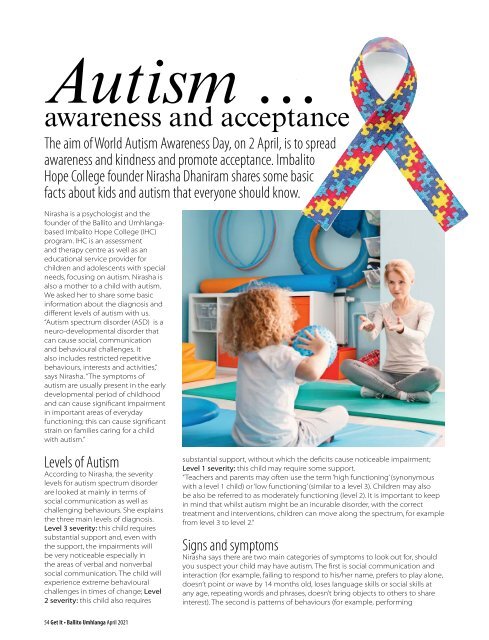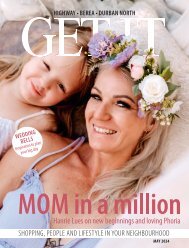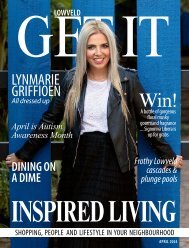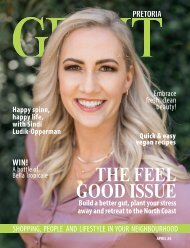Apr 2021 Ballito Umhl
It's our Birthday month - 15 wonderful years! Meet Kgomotso Ndungane of Real Housewives of Durban fame! Umdloti's Graeme Brunt behind Oceaneye - a website featuring 24-hour live feed cameras on popular beaches in our country. We've a strong focus on health, with useful tips for exercising through each stage of your life and some recipes for those embracing a plant-based lifestyle. A spice and curry roundup as well as some delicious recipes from the Indian street food experts. Plus our first, exciting monthly Get It Kids supplement is featured in both our mag and Get it Highway Berea Durban North. Such value for our advertisers!
It's our Birthday month - 15 wonderful years! Meet Kgomotso Ndungane of Real Housewives of Durban fame! Umdloti's Graeme Brunt behind Oceaneye - a website featuring 24-hour live feed cameras on popular beaches in our country. We've a strong focus on health, with useful tips for exercising through each stage of your life and some recipes for those embracing a plant-based lifestyle. A spice and curry roundup as well as some delicious recipes from the Indian street food experts. Plus our first, exciting monthly Get It Kids supplement is featured in both our mag and Get it Highway Berea Durban North. Such value for our advertisers!
Create successful ePaper yourself
Turn your PDF publications into a flip-book with our unique Google optimized e-Paper software.
Autism …<br />
awareness and acceptance<br />
The aim of World Autism Awareness Day, on 2 <strong>Apr</strong>il, is to spread<br />
awareness and kindness and promote acceptance. Imbalito<br />
Hope College founder Nirasha Dhaniram shares some basic<br />
facts about kids and autism that everyone should know.<br />
Nirasha is a psychologist and the<br />
founder of the <strong>Ballito</strong> and <strong>Umhl</strong>angabased<br />
Imbalito Hope College (IHC)<br />
program. IHC is an assessment<br />
and therapy centre as well as an<br />
educational service provider for<br />
children and adolescents with special<br />
needs, focusing on autism. Nirasha is<br />
also a mother to a child with autism.<br />
We asked her to share some basic<br />
information about the diagnosis and<br />
different levels of autism with us.<br />
“Autism spectrum disorder (ASD) is a<br />
neuro-developmental disorder that<br />
can cause social, communication<br />
and behavioural challenges. It<br />
also includes restricted repetitive<br />
behaviours, interests and activities,”<br />
says Nirasha. “The symptoms of<br />
autism are usually present in the early<br />
developmental period of childhood<br />
and can cause significant impairment<br />
in important areas of everyday<br />
functioning; this can cause significant<br />
strain on families caring for a child<br />
with autism.”<br />
Levels of Autism<br />
According to Nirasha, the severity<br />
levels for autism spectrum disorder<br />
are looked at mainly in terms of<br />
social communication as well as<br />
challenging behaviours. She explains<br />
the three main levels of diagnosis.<br />
Level 3 severity: this child requires<br />
substantial support and, even with<br />
the support, the impairments will<br />
be very noticeable especially in<br />
the areas of verbal and nonverbal<br />
social communication. The child will<br />
experience extreme behavioural<br />
challenges in times of change; Level<br />
2 severity: this child also requires<br />
substantial support, without which the deficits cause noticeable impairment;<br />
Level 1 severity: this child may require some support.<br />
“Teachers and parents may often use the term ‘high functioning’ (synonymous<br />
with a level 1 child) or ‘low functioning’ (similar to a level 3). Children may also<br />
be also be referred to as moderately functioning (level 2). It is important to keep<br />
in mind that whilst autism might be an incurable disorder, with the correct<br />
treatment and interventions, children can move along the spectrum, for example<br />
from level 3 to level 2.”<br />
Signs and symptoms<br />
Nirasha says there are two main categories of symptoms to look out for, should<br />
you suspect your child may have autism. The first is social communication and<br />
interaction (for example, failing to respond to his/her name, prefers to play alone,<br />
doesn’t point or wave by 14 months old, loses language skills or social skills at<br />
any age, repeating words and phrases, doesn’t bring objects to others to share<br />
interest). The second is patterns of behaviours (for example, performing<br />
54 Get It • <strong>Ballito</strong> <strong>Umhl</strong>anga <strong>Apr</strong>il <strong>2021</strong>


















